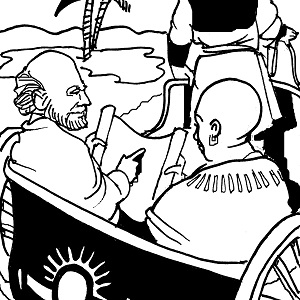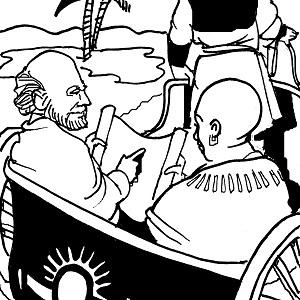

“In his humiliation justice was denied him. Who will tell of his posterity?” (Acts 8:33, quoting Isaiah 53:8).
Acts 8:26-40; John 6:44-51
Acts’ story of the encounter between Philip and the eunuch on the road to Gaza is about a man who has suffered a profound humiliation and loss who is drawn to Jesus because of his suffering. The eunuch, castrated as a child to render him harmless as a guardian of the royal harem, holds a privileged position in the court of Candace, queen of Ethiopia, as her trusted treasurer.
He has high status, rides in a chariot, is well cared for, but he holds in his heart a deep suffering for the loss of his manhood and any hope of posterity, He has literally been cut off from the future, humiliated at the core of his being. When he reads Isaiah’s description of another victim of personal violence who is called a chosen servant of God, his heart leaps within him.
Philip then appears next to the chariot and is invited up to help the eunuch understand that the figure who was silent before the shearer and was led to slaughter was in fact Jesus, crucified for the sins of the world. The man requests baptism and as Philip disappears, he rides on in joy at having found meaning and intimate union with the suffering of Jesus.
This story has added significance because of Jesus’ words recorded in Matthew 19:12: “For some are incapable of marriage from birth, some have been made so by men and some have made themselves as such for the sake of the kingdom of heaven.” The passage has been cited to support voluntary celibacy, but it also addresses the suffering of those rendered involuntarily impotent from birth or by violence or other circumstances beyond their control.
In a culture that prizes sexual performance and equates it with power and success, we might overlook the suffering of those who have been rendered unable to experience sexual intimacy because of physical or mental disability or because they were sexually abused, or because of circumstances of rejection, damaged self-confidence or loveless and abusive relationships that have effectively made them “eunuchs.”
Voluntary abstinence in celibacy becomes all the more heroic in our eroticized culture, and it is clearly a path that has freed many to selflessly serve others and find personal integrity and spiritual focus not compatible with marriage or partnering. These are matters of profound personal discernment that make freedom critical, a source of joy for those who can abstain but a source of suffering for those who have had no choice.
The Good News is that Jesus walks with all of us through life, where suffering comes to everyone, whether in isolation and loneliness or in the complex demands of committed relationships where sexuality is both gift and a source of intimate vulnerability and a school for selfless love. Age and loss of health will make celibates of everyone, and death awaits both the Lothario and the Monk. What matters is whether we learn to love and gives ourselves for something greater than self. Jesus waits to help us and to welcome us into his Kingdom, where everyone will find wholeness in God's infinite love.
Advertisement








